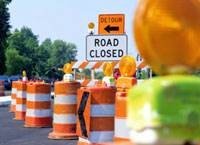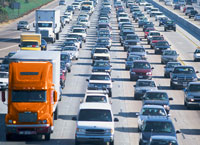Navigating Your Way Through A City
Getting
to know a city is a big job, but getting through a city shouldn't be. Unfortunately,
some of America's metropolitan areas present a navigational challenge for even
the most intelligent, savvy drivers. In fact, according to a recent study conducted
by "Best Places to Live" expert, Bert Sperling, Boston is America's
"most challenging city to navigate", followed closely by Washington
D.C., San Francisco, Baltimore, and New York.
 |
| Women
are more likely than men to become stressed when they don't know where they are. |
Avis Rent
A Car and Motorola teamed up Sperling's to analyze how difficult America's largest
cities are to navigate. Results of the study revealed many travel destinations
ranked high on the roster, including Los Angeles (7), Seattle (8), Chicago (12)
and Orlando (15), like Salt Lake City, San Antonio, and Las Vegas were dubbed
"driver-friendly."
The
Cost of Getting Lost
Demonstrating
growth for the first time since 1999, U.S. residents took more than 122 million
business trips in 2004, an improvement of 4.2 percent from 2003. As business travel
continues to rise, the need to maximize productivity on the road is becoming increasingly
important.
 |
| Avis
Assist helps business travelers find their way around cities without the need
for paper maps or asking for directions. |
According to a consumer survey of 1,000 Americans commissioned by Avis Rent A
Car and Motorola, 65 percent agree that there are certain cities they consistently
find difficult to navigate, and 57 percent agree that getting lost is one of the
worst things that can happen on a business trip. Further, nearly 70 percent of
travelers agree getting lost can negatively impact the outcome of their bus-iness
meeting, including being late.
What
are Some of Your Options and Solutions
Paper
maps can get cumbersome and can be difficult to use when driving alone, and online
mapping services often are incorrect. But there are solutions to keep you safe
and sane.
Handheld GPS System: If you're a frequent business traveler,
especially by car, consider a handheld GPS system. To avoid getting lost, 68 percent
of travelers prefer using a Global Positioning System navigational tool (GPS)
over a paper map, and 72 percent prefer to use a GPS navigational tool with any
car they rent. Four in five travelers find tremendous advantages in having a GPs
tool they can use while driving, as well as to take when they leave the car.
If
You Rent A Car: Many of the cities identified in the study as being among
the most challenging to navigate are, in fact, top car rental markets. So, if
you're renting, for example, Avis offers a tool called Avis Assist, specifically
designed to help business travelers easily navigate their way through unfamiliar
cities.
Avis
Assist gives travelers the ability to bypass unwieldy maps and confusing gas station
directions by gaining instant real-time, spoken directions through a convenient
mobile handset. Avis Assist not only helps travelers reach their destinations
safely, it also provides users the ability to receive information on local restaurants,
the closest ATM, copy centers and service stations.
 |
| Avis
Assist's detour function gives drivers the ability to avoid congested roadways
while also giving alternative routes for the driver to take. |
New Features
Include:
A Detour Function: Giving drivers the ability to avoid
a congested roadway - along with alternate routes around delays.
Spoken
Voice: With safety as a priority, turn-by-turn directions are provided
through a spoken voice. For example, drivers will hear, "...in a quarter
mile turn right onto Route 45 - Manheim Road." Automatic rerouting.
Instead of pressing a button to calculate a new route, Avis Assist will automatically
announce new directions when a driver makes a wrong turn.
Driving
Your Own Car
Traveling
by car through cities unfamiliar to you can be very daunting to say the least.
To avoid all the hassles and fears of getting lost there are many steps you can
take to prepare ahead of time to make your trip relaxing and stress-free. If you
don't have a GPs system, either handheld or onboard in your car, or you don't
have OnStar, then follow these few basic tips.
1.
Plan Your Route Ahead of Time: Get a paper
map of the city to which your are traveling and mark the freeway system you plan
to travel from beginning to end.
2.
Call or Visit AAA: The are
the experts in trip planning and will help you map out your directions mile by
mile with their famous TripTik. They also have offices
all over the U.S. so you can call for updates or stop in as your travel through
each city. They also know where there may be delays and can help you avoid it.
3.
Contact the people you're meeting with at the final destination to confirm specific
directions in their area. Let them know your route and departure date so someone
knows your travel plans.
4.
Be sure you're cell phone is charged at all times to ensure you can call for help
if you do get lost. Keep water and light snacks with you for lengthy unexpected
delays.
5.
America's freeway system has improved dramatically over the past 10 years with
many safe and familiar places to stop. Use the freeway system as much as you can
for your entire trip. Also, many state police have stations along the freeways.
Stop in should you need help with directions.
OnStar:
All GM vehicles now come with OnStar, an onboard safety and security system
that has a live person instantly available at the push of a button. If you own
a GM vehicle with OnStar make sure it's activated especially if you travel by
car a lot. Their live advisors can help you at any given moment with directions
anywhere, anytime. If you're renting a vehicle for your trip, Avis provides GM
vehicles with OnStar as well. |